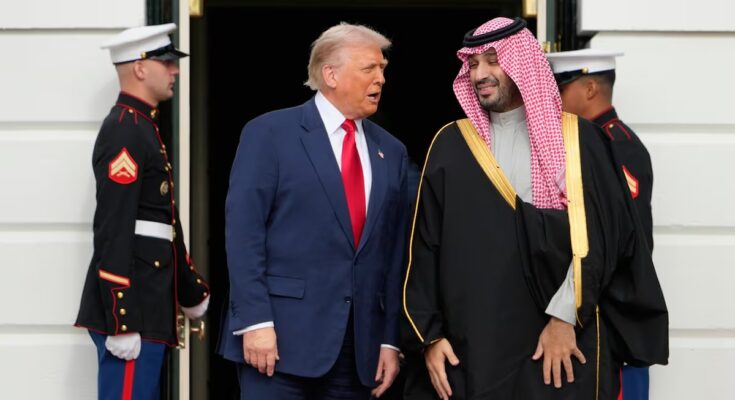The atrocious murder of journalist Jamal Khashoggi in 2018 was a “huge mistake,” “very painful,” as Saudi Arabia’s crown prince, Mohamed bin Salmán, admitted Tuesday in response to a reporter’s question during a meeting with Donald Trump in the Oval Office. The American president, for his part, had angrily reprimanded the journalist for having “put his guest in an embarrassing situation”. “These things happen. He didn’t know anything, let’s forget it,” he declared.
The meeting between the two leaders, the highlight of the official Saudi visit to Washington, was very fruitful. Trump confirmed that both countries have agreed on a defense agreement under which the North American country will provide security guarantees to its ally. Bin Salman announced that he will increase the commitment of Saudi investments in the United States to $1 trillion, which six months ago he had estimated at $600 billion (518 billion euros).
The purpose of the visit was precisely to relaunch bilateral relations and definitively end the tensions over the brutal murder of Khashoggi. The journalist lived in the United States and went to the Saudi consulate in Istanbul to examine some documents. There, according to the United States secret services, Saudi agents were waiting for him who, on orders from Bin Salman himself, strangled him and dismembered his body to secretly remove it from the building.
Trump summed up that episode in his response Tuesday as “things happen.” The president urged us to “put behind us” an issue that “leaves Bin Salman in an embarrassing situation.” “He knew nothing and we can leave things as they are,” he said in defense of his guest. Previously, he praised its “human rights record”.
The economic and defense agreements agreed between the two leaders and confirmed in the meeting could change the military balance in the Middle East, where so far Israel has been the main recipient of the most modern American weapons.
Trump had announced a day before the meeting that he will approve the sale to Saudi Arabia of F-35 stealth fighter planes, the most modern available in the United States and which cost one hundred million dollars per unit. Having them was one of the kingdom’s long-standing ambitions, but until now Washington had resisted selling them to them.
One of the reasons for this refusal was the fear that this technology, among the most confidential available to the Pentagon, could end up in the hands of rivals such as China, with which Riyadh has excellent relations. The other big reason was the opposition of Israel, Washington’s major military ally in the area and which has access to these planes, and fears that the sale to Saudi Arabia could neutralize, at least in part, its strategic advantage in the region. F-35s played a major role in the bombing of Iranian nuclear facilities last June.
Trump had made clear in recent days the importance he attributed to this visit by one of his favorite world leaders, in whose country his family company, the Trump Organization, maintains important business.
Bin Salman was received at the White House with all the honors usually reserved for kings or presidents on state visits: red carpet, cannon fire salute, overflight of warplanes in formation (three F-35s and three F-16s) and joint inspection of the troops in the gardens of the presidential residence, while a military band played their respective national anthems.
Later, on the way to the Oval Office, Trump gave his guest a personalized tour of one of the creations with which he imposed his aesthetic imprint on 1600 Pennsylvania Avenue: his “presidential walk of fame,” the portrait gallery of his predecessors in the White House, where his immediate predecessor, Joe Biden, is represented with a photo of an automatic signature machine.
In the afternoon/evening there was an honorary reception and a gala dinner to which hundreds of personalities from the world of business, politics, culture and the armed forces were invited.
Despite the entertainment, these days’ negotiations are unlikely to lead to significant progress on the main issue of concern to Trump. The American president, who consciously decided that Riyadh would be the first stop on his first foreign trip in his second term, aspires for Saudi Arabia to join the Abraham Accords for normalization between Israel and Muslim countries.
The Republican, who considers these pacts the great foreign policy achievement of his first mandate, is trying to give them new impetus – the White House has announced the signing with Kazakhstan and Indonesia – and the addition of Riyadh, the great economic engine of the Middle East and custodian of Muslim holy places, would be the grand finale.
However, Riyadh is in no hurry to sign these pacts. He conditions his yes on the definition of a roadmap for the creation of a Palestinian state, which does not figure in the peace agreement for Gaza proposed by the Trump administration, while Israel is firmly against any step in that direction, no matter how small.
United Nations Resolution 2803, passed this Monday, enshrines this 20-point plan as international law. Its text declares that “the conditions for a credible path to self-determination and a Palestinian state can finally be met” once the Palestinian Authority completes a reform program and the reconstruction of Gaza advances.
“The United States will establish a dialogue between Israel and the Palestinians to agree on a political horizon for peaceful and prosperous coexistence,” the resolution also adds.
Bin Salman, for his part, also aspired to secure security guarantees for his country, access to artificial intelligence technology and, perhaps, progress in US support for a civilian nuclear energy development program during his talks in Washington. Both leaders also plan to discuss Saudi Arabia’s commitment last May, during Trump’s visit, to invest $600 billion in the United States. Another area of mutual interest in the economic field is collaboration on rare earths and critical minerals.
Riyadh wants an agreement similar to the one reached by Qatar, another of this republican administration’s great Arab allies, last September. Then, Trump signed an executive order guaranteeing the emirate that the United States will come to its defense if it is attacked by a third country, in a commitment similar to that offered by Article 5 of NATO.
For years, Saudi Arabia has sought a defense treaty with the United States that would be ratified by Congress in Washington – the highest possible level for a bilateral pact. Riyadh called for this step as part of the concessions required to sign the Abraham Accords and thus strengthen Washington’s network of alliances in the region against Iran.
But the outbreak of war in Gaza, and related developments in the region, have changed the calculations. The U.S. attack on nuclear targets in Iran last June was the final blow, after Israeli attacks on Hezbollah in Lebanon and American attacks on Houthi militias in Yemen, to leave Tehran and the radical groups supported by that country weaker than at any time in decades.
Washington conditions a treaty on Riyadh agreeing to join the Abraham Accords, and Saudi Arabia seems to be satisfied, for the moment, with a solution similar to that of the Qatar case: a written statement of support, but which, without the support of Congress, would not have the same legal guarantees.



